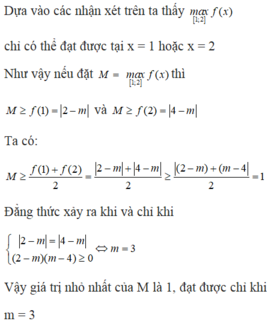tìm giá trị nhỏ nhất của hàm số sau: f(x)=\(x^2+2x+\frac{16}{x+1}\)(x > -1)
Hãy nhập câu hỏi của bạn vào đây, nếu là tài khoản VIP, bạn sẽ được ưu tiên trả lời.


\(f\left(x\right)=3x+\frac{2}{\left(2x+1\right)^2}=\frac{3}{4}\left(2x+1\right)+\frac{3}{4}\left(2x+1\right)+\frac{2}{\left(2x+1\right)^2}-\frac{3}{2}\)
\(\ge3\sqrt[3]{\left[\frac{3}{4}\left(2x+1\right)\right]^2.\frac{2}{\left(2x+1\right)^2}}-\frac{3}{2}=\frac{3}{2}\sqrt[3]{9}-\frac{3}{2}\)
Dấu \(=\)khi \(\frac{3}{4}\left(2x+1\right)=\frac{2}{\left(2x+1\right)^2}\Leftrightarrow\left(2x+1\right)^3=\frac{8}{3}\Leftrightarrow x=\frac{1}{\sqrt[3]{3}}-\frac{1}{2}\).

tách x2+32 = (x2-4) +32
=) f(x) = (x+2)/4 + 9/(x-2) = [(x-2)/4 +9/(x-2)] + 1
cô si 2 số trong ngoặc vuông làm mất (X-2) là xong

ta có: \(f_{\left(x\right)}=\frac{x}{2}+\frac{2}{x-1}=\frac{x-1}{2}+\frac{2}{x-1}+\frac{1}{2}\)
AD cô-si ta được \(\frac{x-1}{2}+\frac{2}{x-1}\ge2\)( dấu "=" xảy ra khi x=3)
=> \(f_{\left(x\right)}\ge2+\frac{1}{2}=\frac{5}{2}\)
=> Min f(x) =5/2 tại x =3

Ta có f(x) đạt giá trị lớn nhất khi \(\frac{1}{f\left(x\right)}\) đạt giá trị nhỏ nhất.
Xét \(\frac{1}{f\left(x\right)}=\frac{x^2+2014x+1}{x}=x+\frac{1}{x}+2014\ge2\sqrt{x.\frac{1}{x}}+2014=2016\)
Dấu "=" xảy ra khi \(\hept{\begin{cases}x>0\\x=\frac{1}{x}\end{cases}}\Leftrightarrow x=1\)
\(Min\)\(\frac{1}{f\left(x\right)}=2016\Leftrightarrow x=1\)
Vậy \(Max\)\(f\left(x\right)=\frac{1}{2016}\Leftrightarrow x=1\)

f(x) = x3 +3/x = x3 + 1/x +1/x +1/x
cô si 4 số làm mất x là xong


\(f\left(x\right)=e^{sinx}-sinx-1\)
\(\Rightarrow f'\left(x\right)=cosx.e^{sinx}-cosx=cosx\left(e^{sinx}-1\right)\)
\(f'\left(x\right)=0\Leftrightarrow\left[{}\begin{matrix}cosx=0\\sinx=0\end{matrix}\right.\) \(\Rightarrow\left[{}\begin{matrix}x=0\\x=\dfrac{\pi}{2}\\x=\pi\end{matrix}\right.\)
\(f\left(0\right)=0\) ; \(f\left(\dfrac{\pi}{2}\right)=e-2\) ; \(f\left(\pi\right)=0\)
\(\Rightarrow f\left(x\right)_{min}=0\) ; \(f\left(x\right)_{max}=e-2\)
